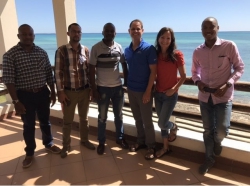Newly Organized Professional Research Team Streamlines Farming Supply Chain in Tanzania
PROVO, Utah – Feb 01, 2019 – The Global Innovation Group (GIG) unites professors from across BYU’s campus to focus on advancing social innovation and fighting global problems, such as poverty. Research teams do this by applying the latest research techniques to individual programs and by developing research ideas for problems that currently have no known solution.
For example, according to WorldBank.org, Tanzania is one of the world’s poorest economies: as of 2012, 70 percent of Tanzanians live on below $2.00 per day1, and U.S. News & World Report notes that more than one-quarter of the country’s gross domestic product is fueled by agriculture2. GIG members became aware of the farming market failures and inefficiencies in southern Tanzania—which affect the population at large—and decided to focus on how they could help bring solutions to the country’s people.
Partnering with Anza, a Tanzanian business accelerator, GIG designed a project to help farmers, distributors, and retailers better work together. Anza connects with local, small-business entrepreneurs, including farmers, to help them create business plans and complete training that will help them become more successful. Anza achieves this goal through one-on-one mentoring; however, this mentoring model isn’t cost effective. GIG proposed a new solution to help address this issue.
In 2017, a team of five researchers from GIG visited Anza’s on-site location to better understand the organization and help lay the groundwork for the project. GIG’s recommendation was that Anza utilize peer-to-peer mentoring rather than top-down, one-on-one mentoring; the peer-to-peer mentoring would pair a more experienced farmer with a less experienced farmer.
Ultimately, GIG researchers predicted that this model will help save money in the long run and increase the effectiveness of Tanzanian entrepreneurs over time. While there is currently no actual data in the social science literature about this procedure, the GIG team is working off a well-respected theory.
Lisa Jones Christensen, the GIG-ANZA project lead, flew out again in February 2018 to put systems in place that would measure the effectiveness of the plan. According to Jones Christensen, one benefit of the GIG group is that it helps BYU identify and build relationships with a wide range of local and global partners.
“We value the opportunity to work with colleagues across campus and across the world,” Jones Christensen says. “It will take all of us working together to learn and disseminate the lessons we need. I am grateful for the new relationships we have formed on campus and abroad through this group.”
Shad Morris, a member of the GIG research team that went to Tanzania, is passionate about the mission of the organization as well. “We aren’t there to provide solutions or just measure the good work they are doing, we’re there to help them bring in more rigorous ways to measure and potentially tweak what they are doing to achieve real and measurable impact,” says Morris.
The research team will continue to measure the results of the Anza peer-to-peer mentoring program as the plan progresses.
"Being part of the GIG team has invigorated me as a professor and given me an opportunity to get involved in social change in new and impactful ways,” Morris continues. “I believe that GIG has the potential to make a real difference in the innovation space."
Media Contact: Alicia Gettys (801) 422-9009
Writer: Heidi Phelon




